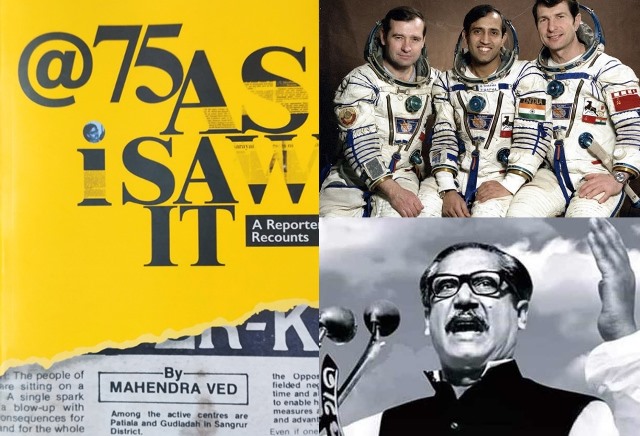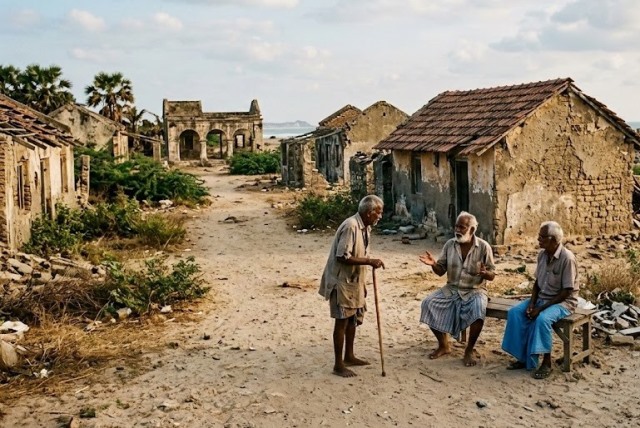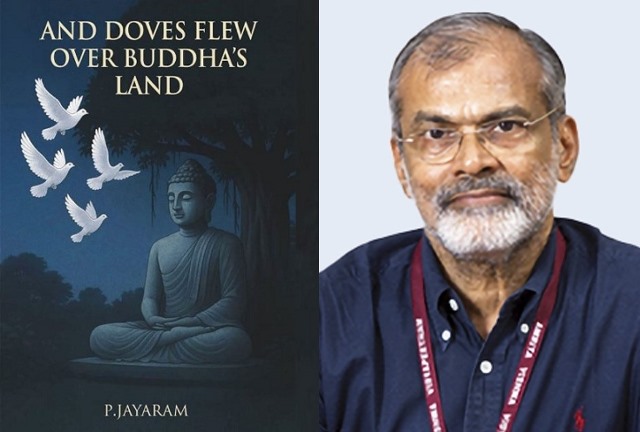
Stories, Memories, Conspiracies A Reporter’s Romance
The smell of newsprint. The quintessential smell of newsprint. For old-fashioned journalists who started working on a typewriter, the catchy cover of this book would be a quick trip down nostalgia lane. It will be soaked with the sweet and salty memories of the heady atmospherics of a bustling, noisy and chaotic newspaper office, with the newspaper in black & white arriving next morning as a testimony of their faith in their loved, addictive profession. This book, and this cover, tells us this story of the 5 Ws and 1 H, along with the byline, the typeface, the point size and leading, and the headline, half-hidden.
@75 As I Saw It: A Reporter Recounts, penned by seasoned journalist Mahendra Ved, is what it claims to be: a reporter’s notebook and close encounters fleshed out with anecdotes, stories, revelations, memories, journeys, conspiracies, murders, riots and violence, prime ministers and politicians, and film stars and celebrities. In this journey, now at 75 in year 2024, for a reporter, there is no QED. In this raw copy which must go to the copy desk, there is no full-stop in the end.
In a sharply cryptic blurb on the back cover, another seasoned Hindi journalist plays a spoof on himself. His reporter’s journey too is still on, after having traversed all over the world with miscellaneous prime ministers and for other assignments, and having reported from the ground across India, including from the dense forests of Chhattisgarh, living among the adivasis. Says Ramsharan Joshi: “Being @80, I see my contemporary, Mahendra Ved’s creative Avatar @ his 75 as a full bloom of professional accomplishment.”
The introductory chapter, ‘A Reporter’s Audacity’, tells a tale. When he started young, like most of us, there were certain core values and ethics of journalism which journalists had inherited from the profession. I presume many journalists, never ever compromised, till the end of their lives – despite being pushed to the wall. Besides, Ved is proud of his objectivity and neutrality.
He writes: “When I began, giving free publicity to any individual or institution in that ‘socialist’ era was a no. Dealing with private sector enterprise was like a touch-me-not. It was, indeed, one-sided. Now the private sector is the bread-giver, and (the) media is its best – and worst – example.”
He continues: “Field reporters are becoming invisible, and expendable. Ask any committed reporter, he/she will tell you that they have worked at the cost of their health, personal life, personal relationships, etc. Work is the only thing that keeps a reporter going…”
The contradictions have been sharp and jarring in contemporary times. He tells the story of one of his last experiences at The Times of India, Delhi — meeting a young TV reporter in a news briefing. He was “loudly asking questions on cue on cell-phone from his boss – loud enough to disturb the briefing”. The young fellow “accosted” Ved and said, “Sir, please tell me the news point of what he said.”
Ved was reminded of his younger days. He “obliged” him. “Back in the office, my editors watched this reporter’s ‘Breaking News’ on TV. They told me: ‘This is your lead’.”
Ved witnessed a great event in Indian space history. India was collaborating with the Soviet Union on space research. Sputnik, the first elementary satellite, happened in 1957. (Sputnik was the name of a revolutionary newspaper started by Lenin.) Yuri Gagarin was the first man to go to space, something “unthinkable” those days. “When the space hero visited, he took India by storm. He conquered the popular imagination of my generation.”
ALSO READ: How Tricky It Is For Reporters To Cover A War
Later, Ved happened to be in the same Control Room of Doordarshan with Prime Minister Indira Gandhi, one of two lucky journalists. The Indian Space Research Organisation (ISRO) had launched a joint mission with Soviet Interkosmos. Two Soviet astronauts and Squadron Leader Rakesh Sharma of the Indian Air Force spent seven days, 21 hours and 40 minutes aboard the Salyut orbital station. Air Chief Marshal Dilbagh Singh addressed the PM: “Madam, now you can speak to him.”
Rakesh Sharma was asked about his health, his food, if he had slept properly, and how it felt to be in space. He said, “Zaroorat se zyada hi khatey hain.” He also said that the crew practiced yoga. (Mrs Gandhi too was a trained yoga practitioner. )
“Wahan se Bharat kaisa dikhta hain,” She asked. He said, “Saare jahan se accha!”
“There was a hushed silence. Nobody clapped… The PM’s face lighted up… A lump rose in my throat…”
Rakesh Sharma was honoured with the Ashok Chakra. He also received the ‘Hero of the Soviet Union’ award.
Many of us, as reporters, saw at close range and documented the State-sponsored massacre of Sikh citizens in November 1984 in Delhi and elsewhere, after the assassination of Mrs Gandhi. The organized mass murders, loot and violence went on four days and the Indian State and its law enforcement agencies refused to move.
Ved remembers his Sikh neighbours in a locality where he lived in a rented house with his wife. When he left the place, neighbours came to say goodbye. “Among them was a Sikh family. Its patriarch, whom I only knew as ‘bauji’, insisted that we have our last meal together. That evening he repeatedly said: ‘We will not forget 1984’.”
During those turbulent days, Bauji and his three sons visited him regularly. They would spend the whole day in Ved’s house and then leave after dinner. “No queries were needed. Fear had made them seek refuge.”
“With the Press label on my scooter as the only protection, like any other reporter, I rode on prominent through-fares seeing burning taxis and taxi-stands, presumably, Sikh-owned, and fleeing men being shorn of their turbans. It was scary to see hundreds of stick-wielding men, shouting slogans in a riotous mood, thronging the VVIP security zone, as the policemen passively looked on…” The Delhi Police had let law and order slip out of their control.
Ved was posted in Dhaka when Sheikh Mujibur Rehman, the founding father of Bangladesh, and 27 of his family members, security chief and servants were murdered after an army coup. Mujib’s brother and brother-in-law, two sons and their wives, one of them pregnant, his third son, just about 10, were murdered. He remembers this radio announcement in the morning of August 15, 1975: “This is Major Dalim speaking. Under the robust leadership of Khndoker Mushtaq Ahmad, the armed forces have taken power. Sheikh Mujib and his government has been ousted. From now on, Martial Law has been declared…”
It was a grim day, but a “journalist cannot place himself/herself above the news”. While airports and communications came under army control, Ved was able to smuggle out two reports, one with his wife and another with a passenger who were flying to Calcutta.
Interestingly, Ved points to the invisible hand of a section of the CIA behind the assassination. He writes about two officials in the US embassy in Dhaka. “Both officers became known after the August 15 events. In many reports and analysis, Cherry was cited as the CIA station chief in Dhaka. That Sheila was seen dancing at a Dhaka hotel with Dalim and Cherry allegedly ‘helped’ the coup d’etat became known to the world..”
It is also well known that the US had backed and propped the army dictatorship in Pakistan. While Soviet Union backed India, and the freedom movement in Bangladesh, the Americans were unhappy with the massive victory of the Indian forces, the liberation of Bangladesh, and the surrender of thousands of Pakistani troops. The US establishment was a tacit observer of the genocide and mass rapes unleashed by the Pakistani army in Dhaka and elsewhere, soon after they had sensed their inevitable defeat.
Mahendra Ved’s book is loaded with anecdotes and revelations. A close reading would suggest deeper nuances and political ramifications. For journalists, old and young, this is a reporter’s diary which heightens the beauty of the profession, and shows us, how we, as journalists, have lost our way in contemporary India.
For more details visit us: https://lokmarg.com/
I have known Mahendra Ved as an analyst of day-to-day world affairs even as a First-Year student of St. Xavier’s College, Bombay, in1965 when we first met. As the years rolled by, Mahendra’s insight into politics grew by leaps and bounds. Soon after graduation, Mahendra left for New Delhi to seriously pursue his career as a a journalist. Despite the distance between Bombay and Delhi, we kept in touch, meeting each other in Bombay during his visits to amchi Mumbai. We have common friends who update each other about one another.
Mahendra is a true secularist. I have never seen him even once rake up parochial issues gainst Islam, Christianity, Sikkhism or any other faith. He is a gem of a person, and I am proud that we are friends and hold each other in high esteem.
I have yet to order his book but will do so as soon as I get someone who knows how to order it online.
My best wishes to Mahendra Ved. I am certain the book will do well. I am certain that I will finish reading it in three days.
Gul Sheikh



